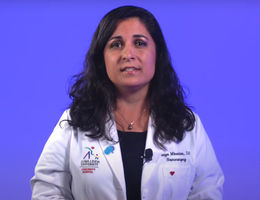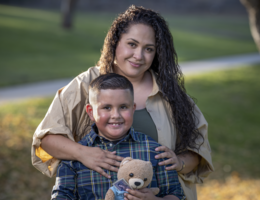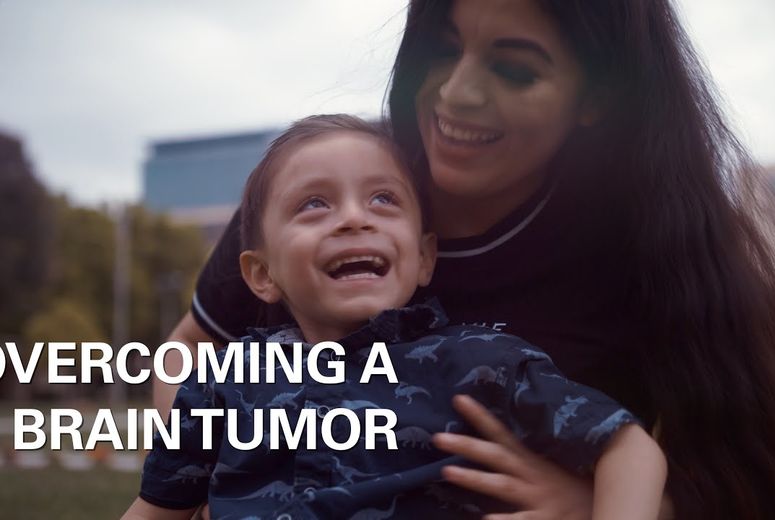We understand how challenging it is when your child has a disorder of the brain, spine or nervous system. Our team of experts provide hope, support, and quality care tailored to your child’s needs.
Our surgeons are specially trained to perform complex brain and spine surgery with excellent outcomes. Using minimally invasive techniques (those with fewer and smaller incisions), we can treat your child’s condition while reducing injury to normal tissue.
Why Choose Us for Pediatric Neurosurgery
- Advanced technology: Your child’s surgery is performed with the latest surgical technology, offering the best possible outcomes. Our technology includes surgical robotics, laser ablation, and endoscopy.
- Image-guided mapping tools: To provide your child safer, more effective care, our surgeons plan and perform procedures using sophisticated imaging tools. These tools provide real-time imaging, allowing our team to tailor their approach both before entering the operating room and during surgery.
- Family-centered approach: You and your child receive the support and education you need at every point in your journey. We’re here to help, from before your child is born through childhood, adolescence, and young adulthood.
- Every specialist you need: Our neurosurgeons, neurologists and other specialists combine their expertise for your child’s complete care.
Conditions We Treat
Our pediatric neurosurgery team provides expert care for a wide range of neurological conditions, including:
- Arachnoid and cerebral cysts: Fluid-filled sacs that can develop in the brain, skull, or spinal cord.
- Brain and spinal cord tumors: Treatment for both benign (non-cancerous) and malignant (cancerous) tumors.
- Cerebral palsy: A group of disorders affecting movement, muscle tone, and balance, often caused by early brain development issues.
- Chiari malformations: A congenital condition where brain tissue extends into the spinal canal, potentially causing headaches and balance issues.
- Congenital Anomalies: Rare conditions in which parts of the scalp, skull, brain, or spine do not develop properly, such as encephaloceles.
- Craniosynostosis: Premature fusion of skull sutures that can interfere with normal brain and skull growth.
- Epilepsy: A neurological disorder characterized by recurrent seizures, including cases of medically intractable epilepsy that do not respond to medication or where surgery may be an option.
- Head and spinal trauma: Treatment for injuries to the brain, skull, spine, or spinal cord.
- Hydrocephalus: A buildup of cerebrospinal fluid in the brain's cavities, which can cause increased pressure.
- Hydrocephalus In Utero: Excess fluid in the brain of an unborn baby, diagnosed and managed during pregnancy.
- Moyamoya Disease: A rare condition where arteries at the base of the brain become narrowed or blocked, reducing blood flow.
- Neurofibromatosis: A genetic disorder that causes tumors to form on nerve tissue and can affect various body systems.
- Spina bifida (Myelomeningocele): A condition where the spinal column does not close completely during fetal development.
- Stroke: A disruption of blood flow to the brain that may require surgical treatment, even in children.
- Tethered spinal cord: A condition where the spinal cord is abnormally attached, limiting movement and potentially causing neurological symptoms.
- Vascular malformations: Abnormal blood vessel development in the brain or spine that may require intervention.
Services We Offer
Our pediatric neurosurgery team provides advanced, compassionate care for a wide range of neurological conditions. Services include:
- Cranial Surgery: Procedures involving the skull or performed to access and treat conditions within the brain.
- Craniosynostosis Surgery: Corrective surgery for infants and young children to treat premature fusion of cranial sutures and support healthy brain growth.
- Deep Brain Stimulation (DBS): A treatment for movement and seizure disorders that involves implanting electrodes to deliver electrical impulses to targeted areas of the brain.
- Endovascular Procedures and Embolization: Minimally invasive techniques using catheters to treat vascular conditions of the brain and spine, including embolization to block abnormal blood vessels or control bleeding.
- Endoscopic Surgery: Minimally invasive procedures guided by a small camera inserted into the skull or spine to treat brain or spinal conditions with less disruption to surrounding tissue.
- Laser Ablation Surgery: A targeted therapy that uses heat from laser light to destroy brain tumors or abnormal brain tissue with precision.
- Selective Dorsal Rhizotomy (SDR): A procedure to reduce muscle stiffness and spasticity in the legs, often performed for children with cerebral palsy.
- Spine Surgery: Surgical care for a wide range of spinal conditions, including spinal cord and nerve abnormalities, provided by pediatric specialists.
- VP Shunt Placement (Cerebral Shunt): A procedure to treat hydrocephalus by implanting a shunt system that helps drain excess cerebrospinal fluid from the brain to another part of the body.
What to Expect
From the moment your child is diagnosed with a neurosurgical condition, our team is here to support your family. Our experts help you understand your child’s diagnosis, all of the possible treatment options and the steps to prepare for surgery.
Assessment and Diagnosis
You and your child will begin by meeting with a surgeon, who will evaluate your child’s medical history and symptoms. We may recommend imaging tests — such as a CT scan, ultrasound, or MRI — to help identify and locate any abnormal areas in your child’s brain.
Depending on your child’s condition, we may also recommend a cerebral angiogram. This test produces images of blood vessels to detect problems such as aneurysms (bulging or bleeding vessels) and brain malformations.
Treatment
Neurosurgery can improve or preserve your child’s physical and mental function. In some cases, it may be necessary to save your child from life-threatening conditions. No matter what condition your child is facing, we’re here to provide the best treatment possible. Our surgeons are on the leading edge of neurosurgery, using the latest techniques, advancing research and pioneering treatments.
If your child needs surgery, we will order diagnostic tests to help determine the most appropriate procedure for their condition.
Follow-Up
Once your child is ready to leave the hospital, we’ll provide detailed information about taking care of them while they recover at home. We’ll also schedule a follow-up appointment to check on how your child’s recovery is progressing. After that, we’ll continue check-ups as needed for your child’s personal journey through recovery.
How to Get Help
To learn more about how to get a referral to our pediatric neurosurgeons, call 877-558-0800. We offer same day appointments if your child needs urgent care.

Prevent Shaken Baby Syndrome

Child and Infant Trauma Prevention
Related Conditions & Treatments









